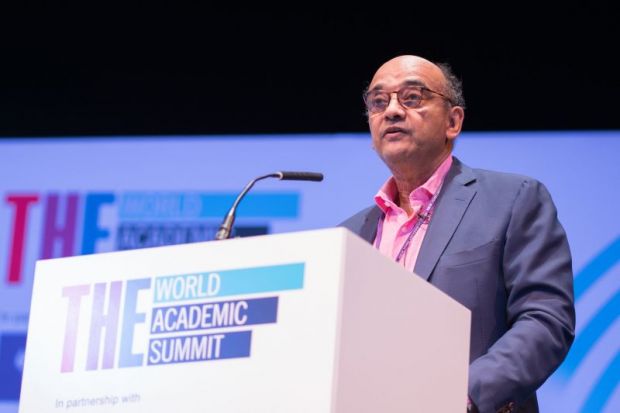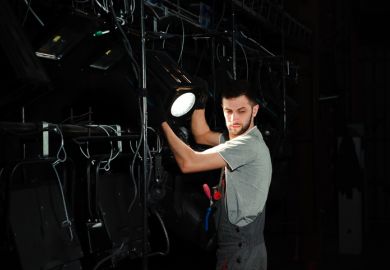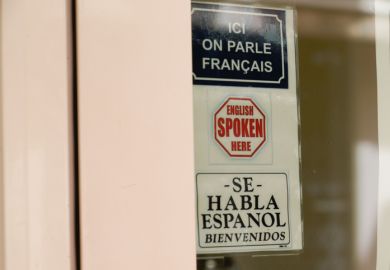National humanities medallist Kwame Anthony Appiah had a memorable first college dinner as a young undergraduate at the University of Cambridge.
Sitting down with a group of strangers, he noted how the conversation flitted from biochemistry to Latin poetry as the young students showed off their academic prowess.
“It was wonderful, and I thought: ‘OK, this is the place for me,’” said the cultural theorist, who serves as professor of philosophy and law at New York University (NYU).
He contended that he was able to get “a lot of my education just hanging out with people” at Cambridge but also benefited from switching degree programmes in the first year – from medicine to philosophy – meaning he became an anomaly in the UK system in studying both sciences and humanities at undergraduate level.
THE Campus views: Classes need less focus on employability and more on profound learning
This put him more in line with the US way of doing things, and Professor Appiah considers the American-style liberal education model of studying a range of subjects before majoring in one as generally a better way of organising undergraduate studies.
“If you think it is important to get a general education, that’s a better system,” he said. “By the time I graduated from Cambridge with a degree in philosophy, I knew an awful lot of philosophy – more than the typical philosophy major in the US – as it was all I had been doing for two years.”
In the event, Professor Appiah would put this to good use – forging a career in philosophy that has seen him work at NYU and Yale, Harvard and Princeton universities as well as in Ghana, the birthplace of his diplomat father, and write a column for The New York Times.
But, he said, having only one kind of job is unusual in the modern world, and “I don’t know that such an intense education in philosophy alone would have been the ideal preparation for many other things I could have done”.
Most of those who take his classes are going to end up doing any number of things throughout their careers, Professor Appiah said. Even if they stick with the same company, what they do is likely to change, he added, pointing out that Netflix started as a video rental store before morphing into the online-streaming behemoth it is today.
“A bit of this and a bit of that is better preparation for a life where you will have many kinds of opportunities,” he said.
It is for this reason that he cautioned against moves towards job-specific degrees. The US does not have undergraduate degrees in medicine and law, and Professor Appiah was critical of degrees in areas such as accountancy.
While he admitted that today’s undergraduate rightfully has more economic anxiety than those of his generation – who assumed they would “be all right” having achieved a decent degree – those who consider the function of a university is to produce people who are going to be economically successful are “losing at the first step of the argument”.
“[It] puts pressure on you to think about this narrower economic question and pulls you away from thinking about the question you should be thinking about: am I being prepared to live a great life?” he said.
Perhaps slightly more selfishly, Professor Appiah pointed out the US system means that “even if no one majored in philosophy, we would still be teaching philosophy, so there is less pressure in terms of employment”.
It may also explain why attacks against universities in the US have focused on the perceived political stances of professors rather than the worth of a humanistic education, he said.
Whether the UK should or could ever switch to a more American system is difficult to say, Professor Appiah conceded, as it would require “very radical reforms” to curricula and governance structures, with courses potentially having to be reviewed by interdisciplinary committees.
But he pointed out that there are models for this in the UK, be it Oxbridge’s famed philosophy, politics and economics courses or the cross-disciplinary work that happens in research.
“I think the cross-fertilisation is there; it is just not terribly successfully communicated to the undergraduate populations. If it were to occur, it would almost certainly be too driven by cost considerations in England at the moment,” he said.
A more general education can no longer be left to school education, either, according to Professor Appiah, given the breadth of knowledge required to thrive in the modern world and relative intellectual immaturity of younger teenagers.
“It is reasonable for us to say we want to produce people who we think of as college educated and that means they can understand a statistical argument, they have a rough idea of what an amino acid is, they know roughly how old the universe is and the main theories of the workings of the universe, have read a decent amount of literature, they know some philosophy, economics and so on,” he said.
POSTSCRIPT:
Print headline: ‘UK should adopt US-style majors system’
Register to continue
Why register?
- Registration is free and only takes a moment
- Once registered, you can read 3 articles a month
- Sign up for our newsletter
Subscribe
Or subscribe for unlimited access to:
- Unlimited access to news, views, insights & reviews
- Digital editions
- Digital access to THE’s university and college rankings analysis
Already registered or a current subscriber?








